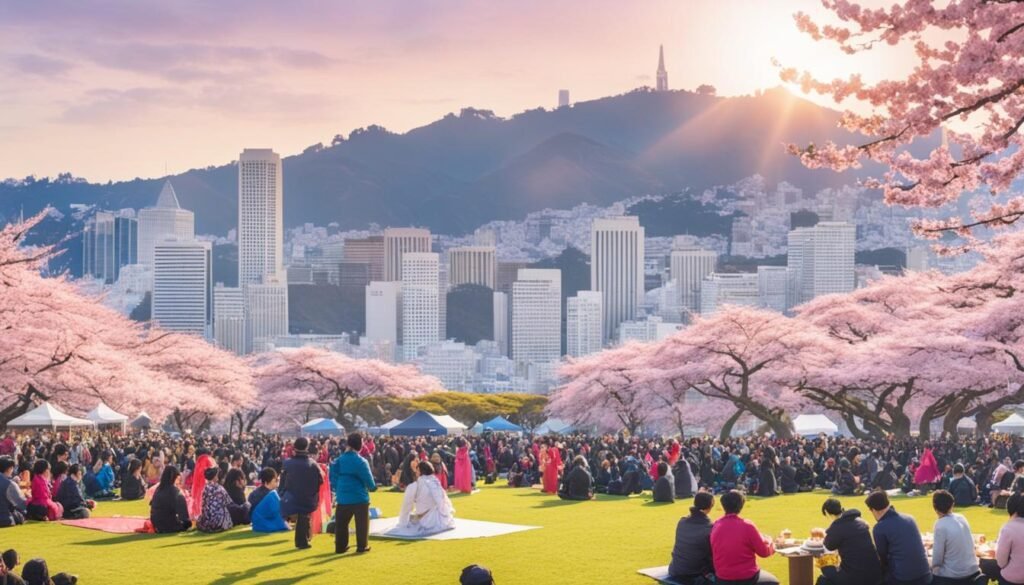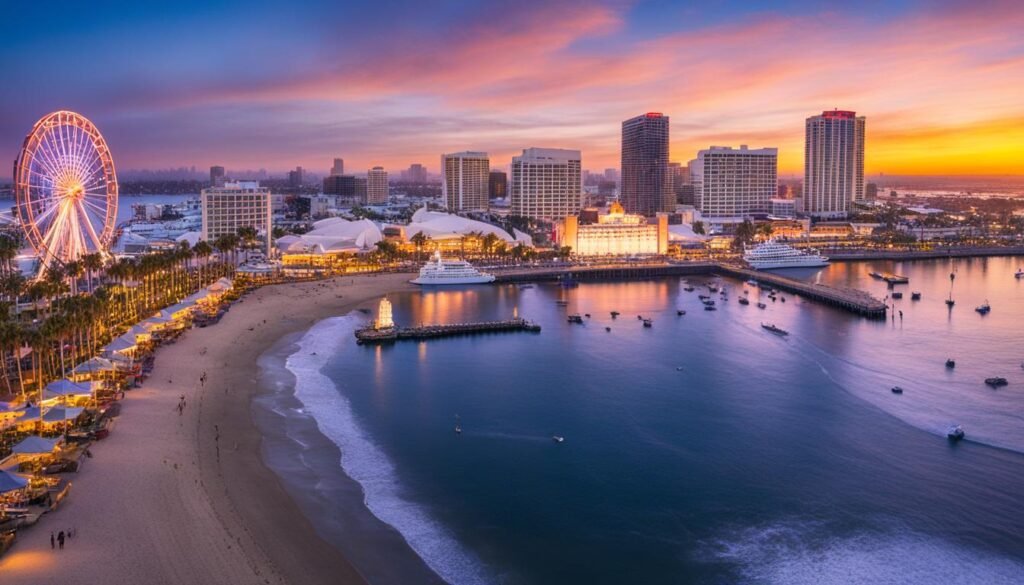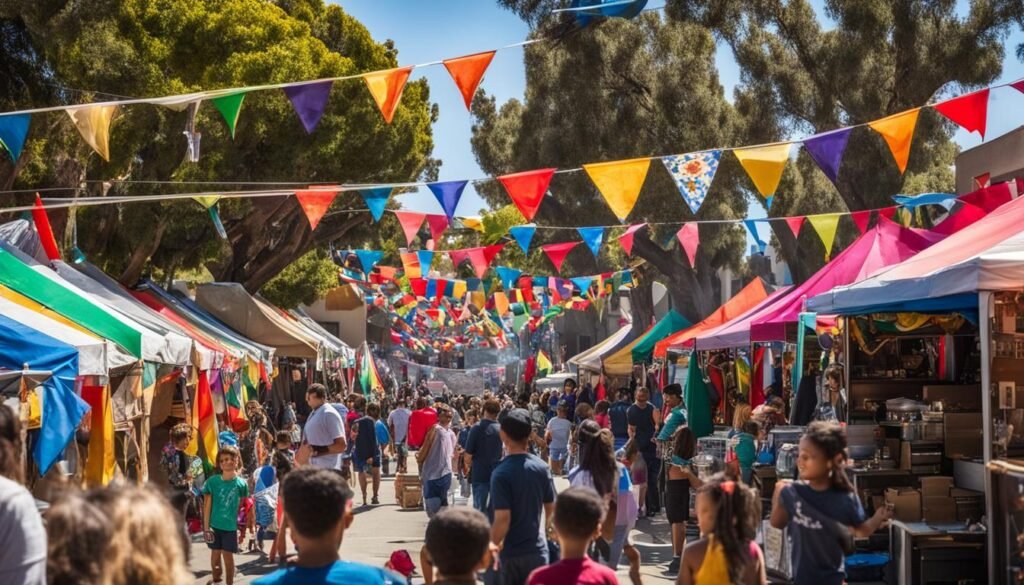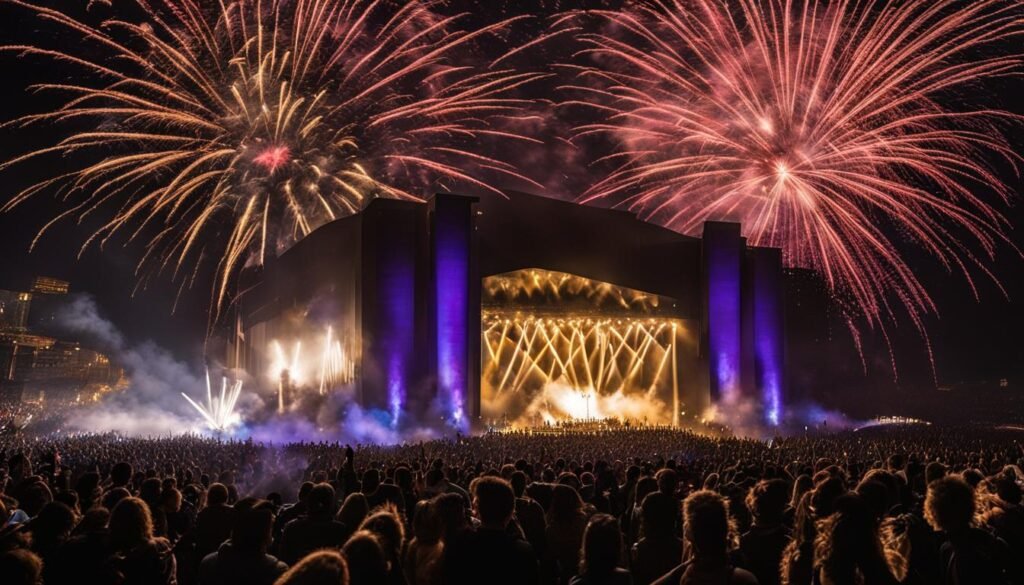As a resident of Los Angeles, I am constantly amazed by the vibrant cultural heritage of this city. One of my favorite places to immerse myself in the rich Mexican-American culture is Placita Olvera, also known as Olvera Street. Located in downtown Los Angeles, Placita Olvera is a historic monument and the birthplace of the city. It offers an incredible array of cultural attractions, delicious food, and unique shopping experiences.
Placita Olvera is a hub of energy and excitement, attracting over 2 million visitors each year. Whether you’re a history buff, a food lover, or simply someone looking to explore the cultural fabric of Los Angeles, this destination has something for everyone.
Key Takeaways:
- Placita Olvera, also known as Olvera Street, is a historic monument in downtown Los Angeles.
- The area showcases the rich Mexican-American culture and heritage of LA.
- Placita Olvera attracts over 2 million visitors annually, offering cultural attractions, food, and shopping experiences.
- It is home to numerous historic landmarks, museums, and cultural institutions.
- The vibrant marketplace and dining options at Olvera Street provide a taste of authentic Mexican cuisine and crafts.
The Cultural Attractions of Placita Olvera
Placita Olvera, also known as Olvera Street, is a treasure trove of cultural attractions that highlight the rich history and heritage of Los Angeles. When visiting this historic destination, you will discover various landmarks and museums that offer a glimpse into the city’s past.
America Tropical Interpretive Center
One of the notable attractions in Placita Olvera is the America Tropical Interpretive Center. This site commemorates David Alfaro Siqueiros, a renowned Mexican muralist whose artwork is showcased on the exterior wall of the Sepulveda Building. The center provides insights into Siqueiros’ mural, “America Tropical,” and its significance in Mexican-American history.
Avila Adobe
The oldest building in Los Angeles, Avila Adobe, is another must-see attraction on Olvera Street. This adobe house dates back to 1818 and showcases the architectural charm of the era. Visitors can explore its rooms and learn about the early days of the city.
Italian American Museum of Los Angeles
For those interested in the contributions of Italian-Americans to the development of Los Angeles, the Italian American Museum offers a comprehensive look at their cultural heritage. The museum features exhibits that celebrate the Italian-American community’s impact on the city’s art, history, and culture.
Sepulveda House
Dating back to 1887, the Sepulveda House is a well-preserved Victorian residence that tells the story of the Sepulveda family, one of Los Angeles‘ prominent early families. Visitors can explore the rooms and admire the intricate details of this historic house.
LA Plaza de Cultura y Artes
LA Plaza de Cultura y Artes is a cultural center that documents and celebrates the Mexican-American experience in Los Angeles. Through its exhibits, events, and educational programs, the center aims to promote understanding and appreciation of Mexican-American heritage and contributions.
Pico House
The Pico House, a grand hotel constructed in 1869, stands as a testament to the city’s rich history. With its distinctive architectural style, the Pico House offers a glimpse into the opulence of the past. Visitors can learn about its significance and enjoy the surrounding historical ambiance of Olvera Street.
Old Plaza Firehouse
The Old Plaza Firehouse, constructed in 1884, serves as a reminder of the importance of firefighting in the early days of Los Angeles. The firehouse now hosts the Asian-American Resource Center, showcasing the contributions of Asian immigrants to the city.
Chinese American Museum
The Chinese American Museum celebrates and preserves the history and contributions of Chinese immigrants and Chinese-Americans in Los Angeles. Through its exhibitions and programs, the museum highlights the rich cultural heritage and struggles of the Chinese diaspora in the city.
These cultural attractions are just a glimpse of what Placita Olvera has to offer. By visiting these sites, you can delve into the history and culture of Los Angeles while immersing yourself in the vibrant atmosphere of Olvera Street.
Shopping and Dining at Olvera Street
Olevera Street is a cultural attraction in Placita Olvera, where visitors can immerse themselves in the vibrant Mexican marketplace. The street is filled with shops offering a wide array of traditional Mexican handicrafts, clothing, and souvenirs. As you stroll along the bustling street, you’ll be captivated by the colorful displays and authentic Mexican products. From intricately designed ceramics and handwoven textiles to vibrant artwork and festive decorations, the marketplace is a treasure trove for those seeking unique cultural finds.

But the experience doesn’t end with shopping alone. Olvera Street is also a hub for delicious Mexican food. Whether you’re in the mood for street food or a sit-down meal, you’ll find a wide range of dining options to satisfy your cravings. Grab a piping hot tamale from a street vendor or indulge in tacos topped with fresh salsa and guacamole. For a more formal dining experience, traditional Mexican restaurants along the street offer mouthwatering dishes like enchiladas, mole, and ceviche. Whatever you choose, the flavors of Mexico will transport you to the heart of its vibrant culinary heritage.
Historic Landmarks of Placita Olvera
Placita Olvera, located in downtown Los Angeles, is a treasure trove of historic landmarks that play a significant role in the city’s history. Here are some notable landmarks that attract tourists and history enthusiasts:
-
Avila Adobe
Avila Adobe, the oldest house in Los Angeles, is a true historic gem. Built in 1818, it provides a glimpse into early life in the city. Visitors can explore the adobe’s rooms and courtyard, admire the authentic furnishings, and learn about the family that once called it home.
-
Pico House
Pico House, a magnificent hotel constructed in 1869, is another must-see landmark. It served as the premier destination for travelers in Southern California during the 19th century. The architecture and grandeur of Pico House exemplify the opulence of the era.
-
Old Plaza Firehouse
The Old Plaza Firehouse is a historic site that played a vital role in early firefighting efforts in Los Angeles. Built in 1884, it showcases the evolution of firefighting technology and the bravery of the firefighters who protected the city.
-
Sepulveda House
The Sepulveda House, constructed in 1887, provides a glimpse into the affluent lifestyle of the Sepulveda family during the late 19th century. With its Victorian-era architecture and curated exhibits, this historic landmark offers insights into the social and cultural fabric of old Los Angeles.
These historic landmarks transport visitors back in time and offer a deeper understanding of the city’s heritage. Placita Olvera truly stands as a testament to Los Angeles’ rich and diverse history.
Events and Festivals at Placita Olvera
Placita Olvera is a hub of cultural events and festivals that celebrate the diverse heritage of Los Angeles. Throughout the year, the plaza hosts various events that showcase the city’s vibrant culture and traditions. One of the most popular events is the Day of the Dead Festival, a colorful and lively celebration that honors and remembers loved ones who have passed away. The festival features vibrant displays, live performances, and traditional rituals that create a truly immersive experience for visitors.
Another notable event at Placita Olvera is the Mexican Independence Day celebration, which takes place every year on September 16th. The plaza comes alive with music, dancing, and festive decorations as people gather to commemorate Mexico’s independence from Spain. Mariachi music festivals are also a highlight, with talented musicians showcasing their skills and entertaining the crowds with their energetic performances.
The cultural scene at Placita Olvera extends beyond music and art. The plaza often hosts art exhibitions that showcase the talent of local artists and provide a platform for cultural expression. These exhibitions feature various forms of art, including paintings, sculptures, and installations, giving visitors a glimpse into the vibrant artistic community of Los Angeles.

The events and festivals at Placita Olvera add to the lively and festive atmosphere of the plaza, attracting both locals and tourists who are interested in immersing themselves in the rich cultural heritage of Los Angeles. Whether you’re a music lover, art enthusiast, or simply curious about the city’s vibrant traditions, Placita Olvera’s events and festivals offer a unique and memorable experience that shouldn’t be missed.
Explore Union Station and Beyond
While exploring Placita Olvera, visitors can also take the opportunity to visit Union Station, which is located across the street. Union Station is a historic landmark and architectural gem that serves as a major transportation hub in Los Angeles. Its stunning design and blend of architectural styles make it worth a visit.
Beyond Union Station, visitors can continue their cultural exploration by venturing into other parts of Los Angeles that offer a wide range of attractions. The city is teeming with museums, galleries, and theaters where you can immerse yourself in art, history, and culture. Take a stroll through the Getty Center, home to an impressive collection of art from around the world, or explore the Natural History Museum of Los Angeles County, where you can learn about the region’s rich natural history.
Traditional Crafts and Artisanal Experiences
In addition to its historic landmarks and cultural attractions, Los Angeles is a treasure trove of traditional crafts and artisanal experiences. Discover the vibrant artistic community in neighborhoods like Echo Park and Silver Lake, where you can find local artists selling their handmade crafts and unique creations. Explore the bustling Farmers Market at The Grove, where you can shop for locally produced goods and indulge in delicious food from various cultural cuisines.
- Visit Olvera Street and explore the Mexican marketplace for traditional crafts and souvenirs.
- Head to Grand Central Market in downtown LA, where you can find a wide array of local products and artisanal foods.
- Attend a craft fair or artisan market in one of the city’s many parks, such as Griffith Park or Exposition Park, to discover unique handmade goods.
Los Angeles is a city that celebrates creativity and craftsmanship, and there are countless opportunities to engage with traditional crafts and support local artisans throughout your cultural exploration.
Conclusion
Placita Olvera is a cultural landmark and a must-visit tourist attraction in Los Angeles. This vibrant Mexican market is a true representation of the city’s rich Mexican-American heritage. From the moment you step foot on Olvera Street, you are transported to a world of traditional Mexican crafts, captivating cultural experiences, and mouthwatering cuisine.
Exploring the bustling marketplace, adorned with colorful stalls and shops, is a feast for the senses. You can immerse yourself in the vibrant atmosphere while admiring the traditional crafts and clothing on display. It’s the perfect place to find a unique souvenir or gift that captures the essence of Mexican culture.
But Placita Olvera is more than just a shopping destination—it’s a living testament to the history and traditions that have shaped Los Angeles. As you wander through the historic landmarks, such as the iconic Avila Adobe and the grand Pico House, you can gain a deeper understanding of the city’s past. The cultural attractions, including the America Tropical Interpretive Center and LA Plaza de Cultura y Artes, offer fascinating exhibitions and experiences that celebrate the diverse heritage of Los Angeles.
Visiting Placita Olvera is not just a sightseeing trip—it’s an opportunity to connect with the heart and soul of Los Angeles. Whether you’re a local resident looking to explore your city’s cultural roots or a visitor seeking an authentic experience, a visit to Placita Olvera is sure to leave you with lasting memories and a deeper appreciation for the Mexican-American heritage that shapes the vibrant tapestry of Los Angeles.
FAQ
What is the history of Placita Olvera?
Placita Olvera, also known as Olvera Street, is considered the birthplace of Los Angeles and showcases the rich Mexican-American culture of the city.
What are the cultural attractions in Placita Olvera?
Placita Olvera is home to several cultural attractions, including the America Tropical Interpretive Center, Avila Adobe, Italian American Museum of Los Angeles, Sepulveda House, LA Plaza de Cultura y Artes, Pico House, Old Plaza Firehouse, and the Chinese American Museum.
What can I shop for at Olvera Street?
Olvera Street offers a vibrant marketplace where you can shop for traditional Mexican handicrafts, clothing, and souvenirs.
Where can I find Mexican food at Olvera Street?
Olvera Street offers a wide range of dining options, including street vendors selling tacos and tamales, as well as sit-down restaurants offering traditional Mexican cuisine.
What are the historic landmarks in Placita Olvera?
Placita Olvera is home to historic landmarks such as the Avila Adobe, the oldest building in Los Angeles, and the Pico House, a grand hotel that was once one of the most luxurious establishments in Southern California.
What events and festivals are held at Placita Olvera?
Placita Olvera hosts various events and festivals throughout the year, including the Day of the Dead Festival, Mexican Independence Day celebrations, Mariachi music festivals, and art exhibitions.
What can I explore beyond Placita Olvera?
Visitors can explore Union Station, a historic landmark and major transportation hub located across the street from Placita Olvera. Los Angeles offers a wide range of attractions, museums, galleries, theaters, and other opportunities to experience the city’s rich cultural heritage.






